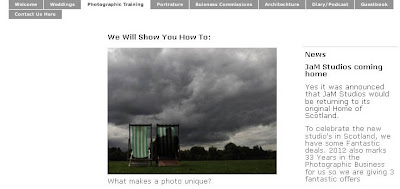A few days ago I was contacted by a photographer in Glasgow, Scotland seeking representation. He provided a link to his website, so I went to take a look. The first thing that seemed odd was the number of spelling errors in the navigation links, titles and text, and the random use of apostrophes.
Looking through the website, the photographs showed a variety of different styles, but they ranged in quality from mediocre to excellent. From my experience, this seems very suspicious. If a photographer can produce excellent images, they know that their portfolio will be judged by the weakest images, so they will only promote their very best work.
Also, it was clear that a fair number of the images were stock photos, not personal work. Of course, many businesses use stock photos on their websites, but should a photographer who is promoting themselves as a wedding/portrait/event/corporate/architectural photographer be using stock images on their website? (unless they are their own images of course!)
To follow up on my suspicions, I turned to Google's Search By Image for help. This quickly showed that the headline 'Wedding Package' photo:
...is an award-winning image by photographer Joy Marie Smallwood:
The headline 'Photographic Training' image:
...is by Reuters photojournalist Toby Melville:
The headline 'Portraiture' image:
...is by Edinburgh photographer Jen Meiklejon:
...and the next image is by Chelmsford photographer Dan Rayner:
One of the 'Boudoir Portraits':
...is by Associated Press photojournalist Kevin Frayer:
...but I cannot trace the photographer for the other image, though it turns out it is of actress Mena Suvari and was published in UK Marie Claire magazine:
Could there be a reasonable explanation for all these different photographers' work appearing on Jam Studios' website? There is talk on the website about them representing different photographers worldwide, so it does seem possible. To make sure, I decided to try to contact the photographers I had managed to trace through their images.
Within 24 hours I got replies from four photographers stating that they know nothing about the Jam Studios website and that their images had been stolen.
There are a great many more images on the Jam Studios website:
...some of which I have managed to trace to the real photographer, such as Belize wedding photographers Conch Creative:
With other images:
...I have found alternative sources, but cannot find exactly who the real photographer is:
So, if someone knows 'Scott' (his now defunct website was called www.definitivepicture.co.uk) please let me know. Please do the same, if you know the photographer for any of these other images (you can click on each screenshot to see a larger version):
...as it seems likely that many (if not all) have been stolen from the original photographers.
Why would a 'professional' photographer do this? Someone who really has '33 years experience in the photography business' must know it is infringing another photographer's copyright to take their images and publish them on a commercial website without their permission. Claiming that those images were produced by you (or your 'studio') is even worse! If this photographer has so much experience, why doesn't he show his own images rather than stealing others?
From a potential customer's point of view this fraudulent behaviour is of major concern. Here is a 'professional photographic studio' soliciting paying clients to produce images for them, but many (if not all) of the images showcased on the website were not produced by that studio. When a customer pays good money for photographic work by this studio, what are the results going to be like, and are they going to have any resemblance to what they could expect from the website images?
With the massive increase in people claiming to be professional photographers in recent years, I have seen a lot of recent discussion in industry forums about the need for formal licensing for those calling themselves 'professionals'. While I think this is unlikely to happen (and don't even necessarily think it is a good idea) I think that fraudulent behaviour like this by people claiming to be 'professional photographers' does present a good argument for formal licensing or regulation.
Tuesday, November 1, 2011
Subscribe to:
Comments (Atom)
































